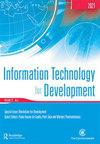信息驱动型经济中的制度发展:信息通信技术能否促进低收入和中低收入国家的经济增长?
IF 5.1
3区 管理学
Q1 DEVELOPMENT STUDIES
引用次数: 9
摘要
信息通信技术(ICT)革命给全球的制度和经济带来了积极的溢出效应,但也扩大了国家间的信息差距。可以解释这些差距扩大的一个关键特征是,在许多发展中国家,信息通信技术基础设施、治理机构和经济增长之间的内生关系正在加深。到目前为止,这些变量之间的联系在发展中经济体中还没有被发现,因此很少有研究探讨它们。本文以2005 - 2019年发展中国家为样本,研究了制度质量、经济增长和信息通信技术基础设施发展之间可能的格兰杰因果关系。矢量误差修正模型的应用揭示了短期内所有变量之间的强相互关系。从长远来看,制度质量和信息通信技术基础设施建设将促进经济增长。本书探讨了这些复杂的关系,并为政策制定者总结了经验教训。我们评估制度质量与信息通信技术基础设施以及经济增长之间的相互作用。我们对2005年至2019年的低收入和中低收入国家进行了格兰杰因果检验。我们表明,在短期和长期变量之间存在格兰杰因果关系。对于每一个案例和规范,信息通信技术基础设施和制度质量都是经济增长的格兰杰原因这一假设得到了支持。在短期内,我们注意到制度质量与经济增长之间存在反馈关系。根据机构质量和信息通信技术基础设施的具体指标,其他短期结果则更加多样化。本文章由计算机程序翻译,如有差异,请以英文原文为准。
Institutional development in an information-driven economy: can ICTs enhance economic growth for low- and lower middle-income countries?
ABSTRACT The information and communication technology (ICT) revolution has brought positive spill-over effects on institutions and economies across the globe, but it has also increased the information gaps between countries. A key characteristic that may explain these widening gaps is the deepening endogenous relationships between ICT infrastructure, institutions of governance, and economic growth in many developing countries. Thus far, the links between these variables have not been discernible in developing economies, so few studies have explored them. In this paper, we investigate the possible Granger causal relationships among institutional quality, economic growth, and ICT infrastructure development for a sample of developing countries for the period from 2005 to 2019. The application of a vector error-correction model reveals strong inter-relationships between all the variables in the short run. In the long run, institutional quality and ICT infrastructure development stimulate economic growth. These complex relationships are explored and lessons are drawn for policymakers. RESEARCH HIGHLIGHTS We assess interactions between institutional quality and ICT infrastructure as well as economic growth. We deploy a panel Granger causality test for low- and lower middle-income countries from 2005 to 2019. We show that there is Granger causality between the variables in the short and the long term. For each case and specification, there is support for the hypothesis that ICT infrastructure and institutional quality both Granger-cause growth in the economy. In the short run, we note a feedback relationship between institutional quality and economic growth. Other short-run results are more varied, based on the particulars proxies for institutional quality and ICT infrastructure.
求助全文
通过发布文献求助,成功后即可免费获取论文全文。
去求助
来源期刊

Information Technology for Development
Multiple-
CiteScore
11.30
自引率
16.70%
发文量
34
期刊介绍:
Information Technology for Development , with an established record for publishing quality research and influencing practice, is the first journal to have explicitly addressed global information technology issues and opportunities. It publishes social and technical research on the effects of Information Technology (IT) on economic, social and human development. The objective of the Journal is to provide a forum for policy-makers, practitioners, and academics to discuss strategies and best practices, tools and techniques for ascertaining the effects of IT infrastructures in government, civil societies and the private sector, and theories and frameworks that explain the effects of IT on development. The concept of development relates to social, economic and human outcomes from the implementation of Information and Communication Technology (ICT) tools, technologies, and infrastructures. In addition to being a valuable publication in the field of information systems, Information Technology for Development is also cited in fields such as public administration, economics, and international development and business, and has a particularly large readership in international agencies connected to the Commonwealth Secretariat, United Nations, and World Bank.
 求助内容:
求助内容: 应助结果提醒方式:
应助结果提醒方式:


